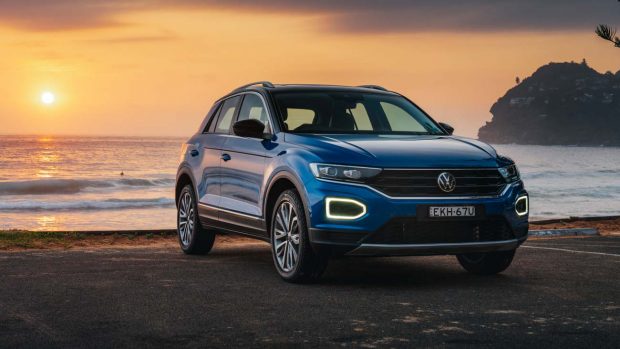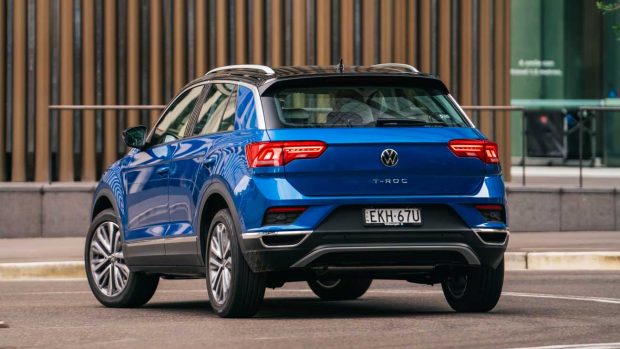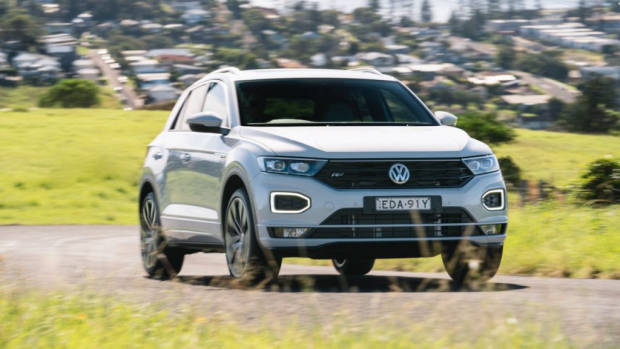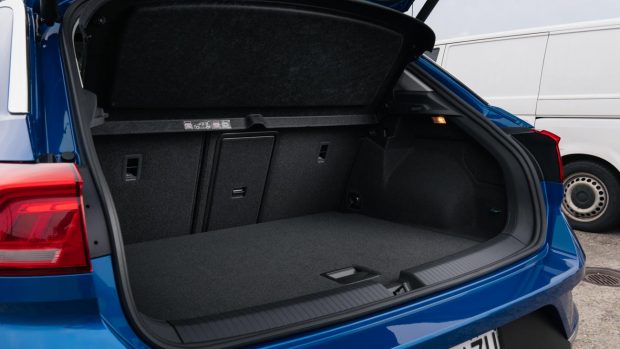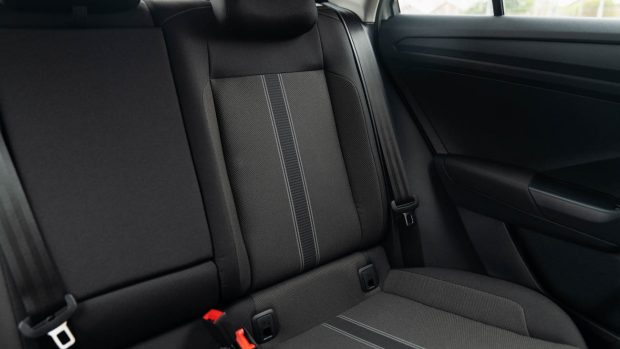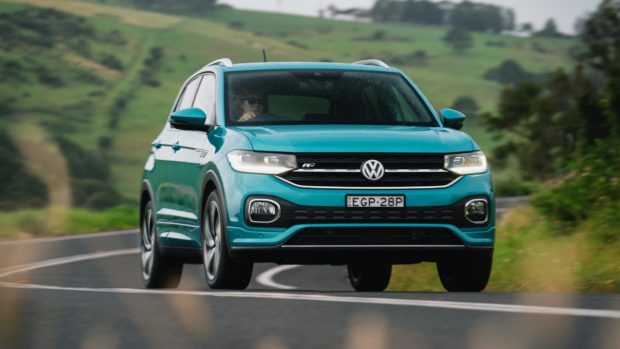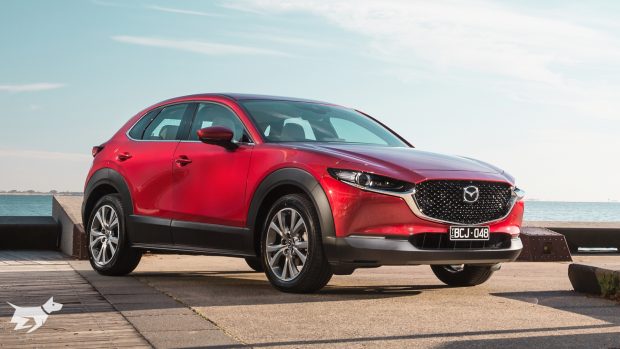-
Car Reviews
- All reviews
- Midsize SUVs
- Small cars
- Utes
- Small SUVs
- Large SUVs
- Large cars
- Sports SUVs
- Sports cars
- Vans
Latest reviews
- Car News
-
Car Comparisons
Latest comparisons
- Chasing Deals
After launching with a high-specification 140TSI variant in 2020, the Volkswagen T-Roc range has expanded with a significantly more affordable 110TSI Style grade.
The Volkswagen T-Roc small SUV range has been expanded in Australia with the addition of a new entry grade dubbed the 110TSI Style.
Starting at a price of $33,990 (before on-roads), the T-Roc 110TSI Style is significantly cheaper than the $40,490 (before on-roads) required for the 140TSI Sport that has been on sale in Australia since August.
Volkswagen has placed considerable emphasis on design for the new 110TSI Style grade: all cars will come with a gloss black roof and 18-inch wheels as standard, along with a unique range of available colours.
The new 110TSI Style variant is front-wheel-drive, and uses a 1.4-litre turbocharged petrol four-cylinder engine producing 110kW of power and 250Nm of torque. It’s an engine very familiar from the Golf and Tiguan lineups.
There’s a major change for the T-Roc 110TSI, though: this is the first Volkswagen-badged vehicle in Australia to ditch a DSG dual-clutch automatic in favour of an eight-speed torque converter gearbox.
Why? Because Australia’s sulphuric fuel prevents Volkswagen from offering the company’s latest, most economical 1.5-litre and DSG combination.
The high-spec T-Roc 140TSI Sport continues above the 110TSI, priced at $40,490. The 140TSI upgrades to all-wheel-drive and a more muscular 2.0-litre turbo petrol engine – the venerable Volkswagen ‘EA888’ motor. Here, it makes 140kW of power and 320Nm of torque.
The 140TSI model also comes with 18-inch wheels as standard, but larger 19-inch alloys are optional.
Todd Ford, product manager at Volkswagen Australia, said the design of the T-Roc was of critical importance for the buyers – the majority of whom are women living in urban areas.
“We know from research that design is the key driver for the small SUV market, buyers won’t compromise on design and want their car to say something about them,” Ford said.
Getting into the T-Roc is simple as touch-sensitive keyless entry to the front doors is standard across the range – as is push-button start.
Inside the small SUV, buyers will find an eight-inch multimedia display and a smattering of fast-charging USB-C ports.
The 140TSI kicks the convenience up a notch, sporting standard wireless Apple CarPlay and Android Auto that will let you ditch a USB cable.
In the 110TSI, you do get smartphone mirroring, but it is wired – unless you option the $2,000 Sound and Vision package that adds wireless mirroring, a digital cockpit, satellite navigation, and a Beats stereo.
The T-Roc 110TSI Style also offers what Volkswagen says is the largest boot in the small SUV class, at 445 litres, while retaining its space saver spare wheel.
The big boot comes at the cost of a more refined rear suspension. In place of the 140TSI’s supple multi-link independent rear suspension, the 110TSI grade has a simpler, cheaper torsion beam rear end.
Not that the 140TSI has a small boot: even with AWD and more sophisticated rear suspension, the up-spec T-Roc still offers 392 litres of boot space.
A power tailgate is standard on the 140TSI, but is included as an optional extra in the Luxury Package for the 110TSI. The package costs $3,500 and $3,800 respectively and includes a panoramic roof, heated front seats and it upgrades the cloth seats to a vienna leather offering.
The Volkswagen T-Roc was given an ANCAP rating of five stars back in 2017 – translating from the car’s Euro NCAP crash test that occurred before the SUV was on sale in Australia.
Standard safety features on the T-Roc include curtain airbags, lane keep assist, driver fatigue detection and parents will welcome the addition of high and low speed AEB with the ability to detect pedestrians and motorcycles.
The reversing AEB is also capable of stopping a collision with a child in the driveway at speeds of up to 10km/h.
Adaptive cruise control is also included with all models, as is blind spot monitoring and multi-collision braking – which will reapply the brakes in the event of multi-car collision.
Powering the 110TSI is an upgraded version of Volkswagen’s carryover 1.4-litre four-cylinder petrol engine making 110kW of power and 250Nm of torque.
Although these stats are down on the 140kW of power and 320Nm of torque developed by the turbocharged two-litre ‘four found in the 140TSI, Volkswagen claims the 1.4’s claimed combined fuel economy rating of 6.2L/100km is the best in its class.
We’ve reviewed the Volkswagen T-Roc 140TSI, and you can read that test here.
The recently released Mazda CX-30 is the closest rival, with its two-litre four-cylinder engine eating through 6.5L/100km with slightly less power and torque at 114kW and 200Nm – but the starting price of $29,990 (before on road costs) is around $4,000 cheaper.
Although the seven-speed dual clutch fits the character of the 140TSI well, Volkswagen have opted to fit a newly developed eight-speed torque converter unit to the 110TSI for a more smooth grand-touring experience. Mirroring the setup of the incoming Mk 8 Golf.
The 110TSI Style is designed to sit in a sweet spot between the 140TSI Sport and the smaller T-Cross 85TSI Style that costs just $3,000 less at $30,990.
Volkswagen says the T-Cross and T-Roc have so far been a success for the brand, selling around 2,200 and 900 units respectively since their launch late in 2020. With the 110TSI grade hoping to help it become a big seller for the brand and help catch up with rivals such as the Mazda CX-30 and Toyota C-HR.
A full review of the Volkswagen T-Roc 110TSI will be available in the coming days.
All prices exclude on-road costs.
Latest news
About Chasing cars
Chasing Cars reviews are 100% independent.
Because we are powered by Budget Direct Insurance, we don’t receive advertising or sales revenue from car manufacturers.
We’re truly independent – giving you Australia’s best car reviews.
